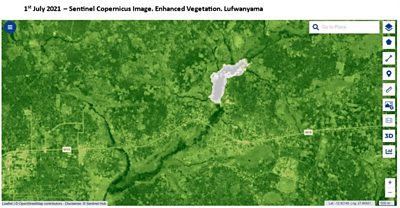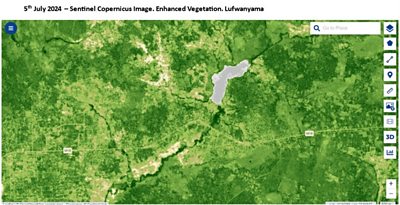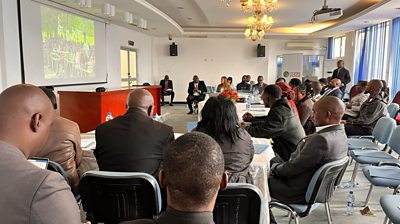Zambia is locked in what the UN has called the driest agricultural season for 30 years. Declared a national disaster by Zambia’s president in February 2024, with no relief yet in sight, it has already created a food crisis and has had a devastating impact on the country’s supply of power, which relies on hydroelectric generation.
Power cuts have lengthened from four hours to an average 12 or more hours per day, impacting the water supply as pumps needed to draw water from reservoirs fail, and bringing many business – including local broadcasters - to a standstill.
�鶹������ҳ��� works across Zambia with more than 30 media partners, with a range of training, mentoring and programming – and our partners told us they were losing advertising income as power cuts forced them to cut back or abandon regular schedules.
We recognised we needed to respond, but first, we needed to better understand how audiences made sense of climate change. We prioritised research and content on climate and started working with investigative journalists covering deforestation and mining activities. We conducted a small study with farming and mining communities to explore how people perceive climate change, and what the role of the Zambian government is or should be.
Innovative research approaches
We wanted to understand how the drought was impacting the community, so we asked them to tell us their story in their own way. We gave Oliver Mukampaila, a local farmer, a mobile phone so he could document his daily life and challenges for a week during the drought. The result was a deeply personal and engaging piece produced entirely by Oliver, providing a unique view into the drought's effects on farmers’ daily lives. For example, he shares insights into;
- The worries around the shortage of grass and foliage for his cattle to eat
- Learning new ways to protect and preserve maize in the severe climate
- The satisfaction for the whole family when their produce is ready for harvest.
Our findings
From our research, it became apparent that climate change is often perceived in a linear manner, directly linking a cause to immediate impacts. For instance, in farming communities, climate change is primarily attributed to deforestation, and the solution is seen as replanting trees. The government's role is perceived as, limited to, compensating them for the loss of crops and food. Interestingly, some community members mentioned facing similar crises in the past, which suggests that the increasing intensity and impact of climate change is not perceived as urgent. In mining communities, environmental issues were recognised and linked to mining activities, but these were mainly understood in terms of their direct impact on the community’s health – such as lead positioning. Similarly, the government's role is seen as having to compensate those affected.
This demonstrates the need for better journalism that questions these issues. In the current drought, journalism can compare figures and statistics, provide stronger context, and create space for greater accountability – for instance, examining the role of government beyond compensation or food and aid provision, to include implementation and enforcement of policies that address underlying causes.
Bridging the knowledge gap in reporting and supporting journalists
With this understanding in hand, we worked with a small cohort of journalists from our radio and television partners, training them to investigate climate issues and climate corruption. The aim, improve public understanding by explaining complex topics such as emissions and the role of government in creating national adaptation plans, and to query the solutions provided so far, and a public narrative which tends to be positive despite the worsening situation. We also connected our journalists with the �鶹������ҳ���’s Climate Unit, for advice and training in producing their own investigative pieces on the climate.
In the training we explained deforestation beyond simply farmers cutting down trees, but the impact of charcoal burning and the unseen businesses and people behind the push on deforestation, the role of traditional leaders, and the role of the government in policymaking.
During the training, we also discovered more interesting challenges in climate reporting:
1. There was an assumption among journalists that audiences had high levels of understanding of climate change. Our insights helped them to take into account the lower baseline of audience knowledge, and we encouraged them to provide context and background information in all their stories.
2. Journalists acknowledged concerns about the accuracy of some government statements, yet they generally regarded the published data as reliable. Our training emphasised the importance of verifying and querying data, regardless of the source.
3. Solutions-based journalism is very important. But it is equally important to critically assess the effectiveness of proposed solutions, and not to fall into solely positive reporting. We suggested that journalists take a closer look at responses from businesses, civil society organisations and governments —such as examining how initiatives like tree-planting are contributing to solutions, and what the outcomes have been after these efforts were implemented.
We looked at satellite photos showing Zambia over time, and as you can see below, the results told of the need for better journalism.


We also explored story ideas involving government policies on climate action, such as evaluating Zambia's commitment to international agreements on forestry and adaptation funding.
Upcoming investigative stories
As a result of this training, we are looking forward to the production of four investigative stories, covering the failure to clean up lead mining pollution; the impact of flooding along Lake Tanganyika; the impact of charcoal burning on the local environment and the growth of e-waste in Lusaka. Many of our talented mentees in Zambia have previously gone on to win awards for their reporting into important issues that affect people’s everyday lives.
�鶹������ҳ���’s work continues to evolve as we explore new ways to engage communities with content, hold leaders accountable, and support informed dialogue on climate issues. Our work has also been focusing on working with our media partners to:
- Report on the effect of drought on citizens;
- Clarify the role of the media in responding to the drought and how it can support citizens with better information provision linking service providers with those affected;
- Clarifying the role of MPs in responding to the drought and encouraging accountability as well as any gaps in response.
Through media, we can improve understanding, drive accountability, and inspire action on climate change.
Read more on our research
These activities are part of the governance projects funded by the Swedish International Development Cooperation Agency, the European Union, and the UK's Foreign, Commonwealth and Development Office in Zambia.
You can check out more of our climate action work around the world here.

